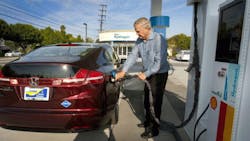GM, Honda Partner on Fuel Cell Vehicle Development
CHICAGO - General Motors (IW 500/4) and Honda (IW 1000/23) will combine forces to develop hydrogen fuel cell vehicles in the hopes of delivering them to customers by around 2020, the U.S. and Japanese automakers said Tuesday.
The partnership is aimed at solving the two biggest problems facing the commercial feasibility of fuel cells: high cost and lack of fueling stations.
"Honda and GM are eager to accelerate the market penetration of this ultimate clean mobility technology," Honda chief Takanobu Ito said in a statement.
"I am excited to form this collaboration to fuse our leading fuel cell technologies and create an advanced system that will be both more capable and more affordable."
Engineers from both companies will work together to develop the next generation of fuel cell technology, sharing all their previous research and future discoveries at joint research facilities in Michigan and Japan.
While the master agreement does not cover manufacturing, it will likely lead the automakers to use essentially the same engine and storage tanks in their fuel cell vehicles.
One of the goals is to reduce costs by working with suppliers to develop standardized - and less expensive - components.
The automakers will also work with governments and fuel station operators to develop the necessary infrastructure to support the vehicles.
"This collaboration builds upon Honda and GM's strengths as leaders in hydrogen fuel cell technology," said GM chief Dan Akerson.
"We are convinced this is the best way to develop this important technology, which has the potential to help reduce the dependence on petroleum and establish sustainable mobility."
Fuel cell vehicles are considered the holy grail of green cars because they emit nothing but water vapor from the tailpipe and can operate on renewable hydrogen gas made from non-polluting sources like wind and biomass.
The current technology allows the vehicles to drive up to 400 miles on a single tank and to be refueled in just a few minutes - an advantage over slow-charging electric vehicles. The propulsion technology also has sufficient horsepower to be used on large vehicles.
GM, which has been working on the technology since the 1960s, has logged nearly three million miles on a fleet of 119 hydrogen-powered vehicles launched in 2007.
Honda leased its first fuel cell vehicle in 2002 and has deployed 85 so far in the U.S. and Japan. It plans to make hundreds of the FCX Clarity available to customers in Japan and the United States in 2015.
Copyright Agence France-Presse, 2013
About the Author
Agence France-Presse
Copyright Agence France-Presse, 2002-2025. AFP text, photos, graphics and logos shall not be reproduced, published, broadcast, rewritten for broadcast or publication or redistributed directly or indirectly in any medium. AFP shall not be held liable for any delays, inaccuracies, errors or omissions in any AFP content, or for any actions taken in consequence.
